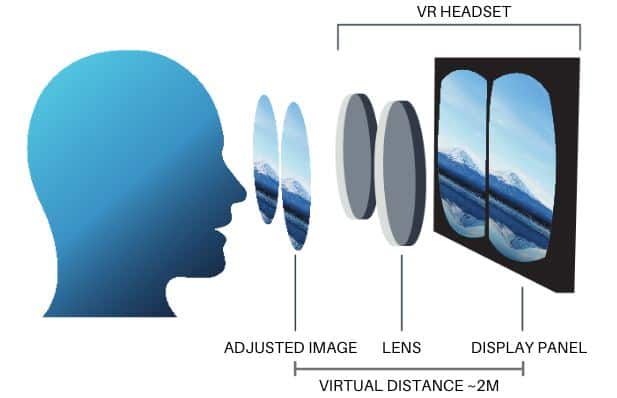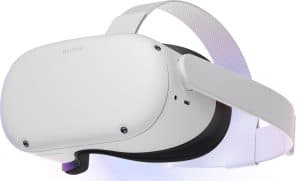Did you know that more than half of the people in the world need some kind of vision correction and therefore wear glasses or contact lenses? Seeing you here reading this piece, chances are you are one of them.

In this article, we are going to find out how well prescription glasses and VR go together. Do you need to wear your glasses for VR in the first place? Which headsets work best with glasses? And are there any alternatives?
These are all questions you will hopefully have answers to, after having read this post. So, without further ado – let does dive in.
Do You Need To Wear Your Glasses For VR In The First Place?
Before diving into the topic of which specific headsets work well with glasses and which additional accessories you can use, we should first answer the question: “Do you need to wear your glasses for VR at all?”
The answer is that it depends. A rule of thumb for estimating your need for wearing glasses with VR is the following. If you remove your glasses and can clearly see objects and text at 6.5 feet (2 meters) distance in real life, then you should also have no problems in VR.
This might not seem logical at all. After all, the VR headset screen is only a couple of inches away from your eyes, right? But it actually all makes sense, so let me explain very briefly.
Have a look at the illustration below.

The truth is that when wearing a VR headset, you are not looking at a screen two inches from your eyes. The lenses before your eyes bend the light from the display(s) in a way that the actual image you see has a focal distance of about 6.5 ft or 2 m in most modern VR headsets.
So, in theory, if you can see objects at this distance well, you can also use VR without glasses and will not suffer from eye strain or loss of image quality.
Keep in mind, however, that each person is different with their own specific eye shape/conditions, etc. Whilst this rule of thumb might apply to most people, it will most certainly not fit everybody.
“It seems I need some vision correction for VR. Can I use VR with Glasses on?”
So what to do if you have “failed” the 2-meter vision test? Or if you have tested your VR headset without glasses and found the image to be blurry and lacking in quality. Can you use VR with glasses on?
Most VR headsets are designed with enough space that they can also fit your glasses inside them. So yes, in most cases you can wear VR headsets with your glasses on. However, there are some drawbacks to consider.
Why wearing glasses with VR headsets is often not the optimal way
1) If your glasses are on the bulky side, they might not fit into the headset properly at all. Look for information on your specific headset from the manufacturer’s website and/or related information in the forums to make sure that it will be a fit for you.
2) If you are going to be wearing your glasses underneath the headset, expect some additional discomfort. The headset will push the pads of the glasses into your nose (and often frames into the sides of your head), which will eventually hurt. Frankly, it doesn`t even matter which headset you choose.
3) Third, but not least, when wearing glasses with your VR headset, you risk scratching the lenses. Several people have reported this to happen even when using special glasses spacers that come with some headsets. You do not want to damage the lense as the scratches will remain visible and disturb your viewing experience. There is no easy fix for that either.
“I am willing to try it out. Which VR headsets are most glasses-friendly?”
If you are looking for the best VR headsets that work well will your glasses on, I would give you the following recommendations.
Oculus Go
The cheapest way you can experience VR is the standalone Oculus Go headset. Keep in mind that Oculus Go only has 3DoF tracking and is meant for seated experiences (multimedia and movies). This headset is not suitable for gaming!
The Go is relatively comfortable to wear with glasses and in the package, you will find a special spacer to reduce the risk of scratching the headset`s lenses. If you are interested, you can read more information about the headset from my previous article
Oculus Quest
Oculus Quest is a standalone and wireless VR headset suitable for both multimedia and especially gaming experiences. Oculus again has thought of people who wear glasses and provided a spacer you can use to reduce the risk of scratching the lenses.
The Quest is one of the most versatile and top recommended VR headsets of 2021 and as I own one myself, I can assure you it is well worth the money! If you are interested, you can view more information and order the headset from Amazon.
PS! Be sure to also check out the successor of the original headset, the Oculus Quest 2
Oculus Quest 2 is still the king of consumer VR! Don't miss out and enter the world of VR experiences, unlike anything you have ever seen!
Oculus Rift S
From the PC-tethered headsets that work well with glasses, Oculus Rift S is what I would recommend you to check out. It is an affordable high-quality headset that offers a lot of value for anyone looking to dip their toes into the world of VR.
The Rift S comes with a depth adjustment button that you can use to move the lenses closer and further away from your eyes (and glasses). This way you can set the optimal distance that fits the shape and size of your glasses.
WARNING
If you are going to use these or any other VR headset with glasses, be sure to first read the manual of the headset. For most headsets, you will find precise instructions about how to wear and adjust the headset properly, so that it would be comfortable to wear and also so that you would not damage or scratch the lenses.
Alternatives to wearing glasses with VR
In all honesty, you will probably soon find out that wearing VR headsets with glasses on is not the most comfortable, nor the safest experience. So what can you do about it? Luckily there are is a selection of solutions to choose from.
Regular Contact Lenses
Although it is a rather obvious solution to the problem, I am gonna list it here anyway. Contact lenses work well with VR headset and you will get the same level of experience any non-glasses-wearer would. If dry eyes are a problem for you with contacts, eye drops work well to mitigate this issue.
VR Prescription Lens Adapters
There are several companies that produce prescription lenses with custom adapters for different VR headsets. How they work is that you clip them on the lenses inside your VR headset. Since the adapters are custom-designed for each different VR headset model, this guarantees a good and tight fit. See the video below for a better understanding.
When ordering, you specify your prescription details provided by your optician and you will receive a lens adapter specific to your vision properties.
There are currently two companies that are popular and receive the most positive feedback: WidmoVR and VR Optician. Check them out, read some reviews if you want, and make your own decision about who to go with. Frankly, you will be fine with both of them.
3D Print Your Own Lens Adapters
Several enthusiasts have taken to time to design 3D models of lens adapters that suit modern VR headsets. For example, you can find 3D models of lens adapters suitable for Oculus Quest, Go and Rift S from here. Do some googling if you want to find 3D models for other VR headsets.
You can then go to a local 3D printing service (or one that is online) and 3D print the adapters. From the link, you can also find suitable lenses for these adapters. Order these as well, and you will get yourself working lenses for your VR headset at a bargain of a price!
To Wrap Things Up
Although VR headset manufacturers have seemingly thought of people who wear glasses, the reality is that it is oftentimes more comfortable and safer to go without them.
Luckily, some people do not have to wear their glasses for VR at all. And for those that do, there are alternative solutions out there, which let them also get the full enjoyment and immersion that VR has to offer.




